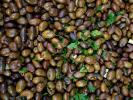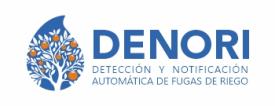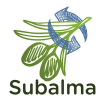AL COMPOST Operational Group: Composting kinetics of alperujo using dephenolization and bioaugmentation strategies
- Type Operational group
- Status In progress
- Execution 2024 -2025
- Assigned Budget 228.516,56 €
- Scope Autonómico
- Autonomous community Andalucía
- Project website GO ALCOMPOST
The AL COMPOST project is aligned with the European Union's rural development objectives, specifically the European Agricultural Fund for Rural Development (EAFRD). The main objectives include improving the competitiveness of agriculture, promoting the sustainable management of natural resources, and advancing balanced territorial development. Through the implementation of innovative technologies in olive oil composting, the project seeks to increase the benefits of the olive oil sector, reduce environmental impacts, and improve the resilience of rural areas dependent on olive growing.
This project also seeks to reduce the use of chemical fertilizers by producing high-quality compost, contributing to a more sustainable and low-carbon economy. AL COMPOST significantly contributes to climate change mitigation and improved water and soil resource management. The proposed composting technology will increase the amount of organic matter in soils, improving their resilience to climate change. Furthermore, the compost produced will reduce dependence on chemical fertilizers, promoting the regeneration of vegetation cover in arid soils, which will help retain water and control erosion. In this way, the project offers a sustainable solution that promotes efficient water and energy use, improving agricultural practices in the Andalusian region.
The added value of the AL COMPOST project lies in the combination of proven technologies, such as dephenolization and the use of fungi, to optimize the composting of alperujo. These innovations are expected to reduce composting times, improving the economic viability of this waste recovery method.
At the same time, the project seeks to ensure the production of high-quality agronomic compost and minimize any phytotoxic effects. Thanks to these improvements, the olive oil sector will be able to adopt this technology on an industrial scale, achieving more efficient and sustainable management of this byproduct. The project is key to the transition toward a circular economy in the olive oil sector, promoting the valorization of agricultural waste. The proposed composting technology converts olive oil, a waste product that currently presents environmental challenges, into a high-value organic fertilizer.
This not only reduces dependence on chemical fertilizers, whose prices have reached historic highs, but also promotes more efficient and sustainable resource management. The revaluation of alperujo is a crucial step toward achieving the sustainability goals set by the European Union for 2050.
AL COMPOST focuses on optimizing the composting of alperujo through two key strategies.
- First, a pretreatment is performed to remove phenolic compounds, using a thermomixing system followed by a three-phase extraction, and an ion exchange column for dephenolization.
- Second, bioaugmentation is incorporated with fungi such as P. eryngii, which accelerate the degradation of recalcitrant compounds.
These innovations seek to reduce composting time and improve the technical and economic viability of the process.
- The project seeks to improve the competitiveness of the olive oil sector through a composting system, increasing profits and reducing environmental risks.
- It also promotes sustainable management of natural resources and reduces dependence on chemical fertilizers.
- It will be developed in the Segura region (Jaén and Granada), contributing to the balanced economic development of a region dependent on the sector.
Stability in ground temperatures will be achieved, given the technical characteristics of the two-layer product (black layer downwards to prevent grass growth and white layer upwards for sun refraction) and therefore water evaporation, both from irrigation and that contributed by rain, in this case by applying a product with hydrophilic/microperforated treatment.
- Coordinator/entity name: Grupo Consule SL
- Postal address: Ring Road 44, Bajo- 23300 Villacarrillo (Jaén)
- Coordinator/entity email: grupoconsule@grupoconsule.es
- Telephone: 953637093
- Grupo Consule S.L.
- Universidad de Granada (proyectosotri@ugr.es)
- ACEITES ASEAL S.L.U. (pperalta@acolsa.es)
- INSTITUTO DE LA GRASA - AGENCIA ESTATAL CONSEJO SUPERIOR DE INVESTIGACIONES CIENTÍFICAS (IG-CSIC) (incentivos.juntadeandalucia@csic.es)
- Fundación Pública “Hub de Innovación Territorial del Común de Segura” (juanfranciscofl@gmail.com)
- Grupo Consule S.L.







